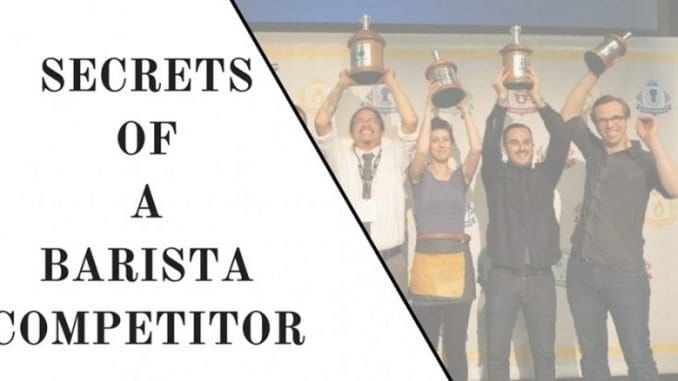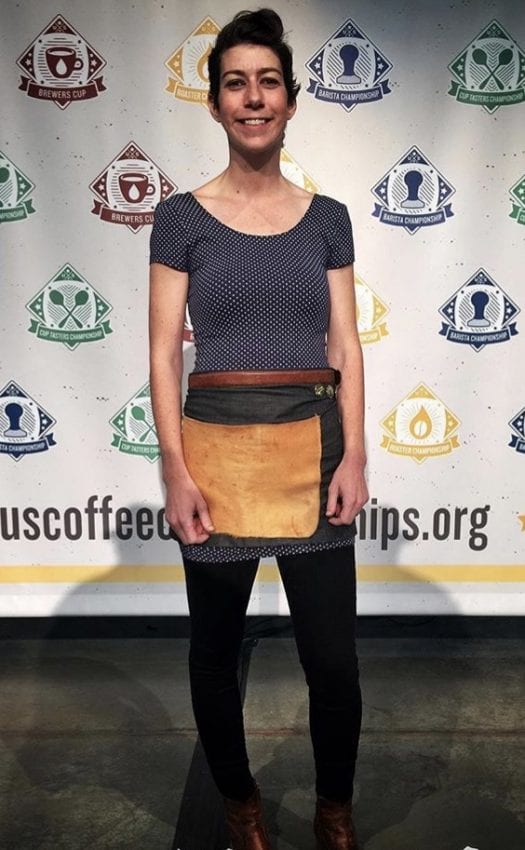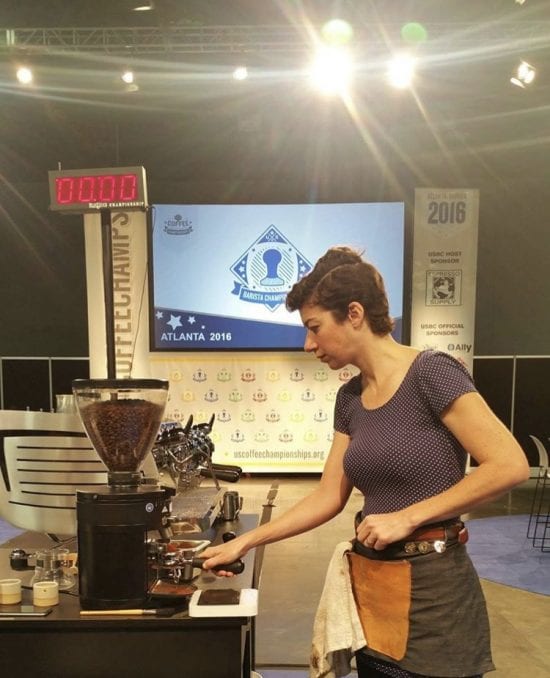
In this series, we’ll share the secrets of barista competitors. From choosing a theme to how to set a practice schedule, we’ll talk to seasoned competitors about how to compete smartly, efficiently, and effectively.
If you look at the rulebook for any barista competition on a national or world level, there’s no rule stating that you have to have a theme. But if you watch any competitor, either in barista competition or brewers cup, most have some guiding idea that shapes their routine.
Choosing a theme can be incredibly daunting—the coffee industry is so huge, so how do you narrow down your focus? “Feeling small is a good thing because the industry itself is so big. I think through my experiences and my coffee interests and I try to find things that are really meaningful both to me and to other aspects of the supply chain,” shares Andrea Allen, owner of Onyx Coffee Lab in Fayetteville, Arkansas.
In 2016, Andrea Allen placed second at USBC. She served a naturally processed Colombian coffee. Her intention and message were clear: naturally processed coffees get a bad rep. Her routine was centered around this idea, so much so that she specifically named it as her reason for competing. Her routine was both genuine to what she believed and an important issue in coffee—Andrea shared a few of her tips for finding and choosing a theme that is true to you and significant to the industry.

- Think about your daily barista life.
“I usually think about things I experience every day. Tedious things, like the same questions customers ask over and over. Or complaints I hear about the specialty industry,” Andrea shares. If you’re unsure of where to start, look around you. Your perceptions about coffee are informed by your workplace and interactions with customers, so draw inspiration from your everyday work life and your position in your space. “As a shop owner I’m always thinking about how to solve these problems or how to educate our customers without alienating them.” It makes me wonder what we as an industry can do better to communicate what coffee is to the consumer base.”
- Your idea doesn’t have to be mind-blowing or earth shattering.
There are a lot of big themes in coffee, but you don’t have to tackle a huge problem to deliver an important message. “I would love to communicate that even though what I presented last season was a pretty big picture idea, I do not believe you have to be out to change the entire supply chain in order to do well,” Andrea reflects about her own routine. “For me what makes coffee unique is that every barista’s perspective is different, is their own.” Perhaps you’re passionate about a particular customer service technique or a moment in coffee—these ideas are enough to carry a theme if you believe in them.

- Don’t be afraid to communicate what you’re passionate about.
It’s easy to get caught up choosing a theme that you think would score well or land with the judges, but what truly speaks to people will always be what you care about most. “Bringing topics that directly connect your passion for coffee with the wider specialty industry to competition is what we need and where I think we’ve seen the best excel,” shares Andrea. The themes that do well almost always reflect what the competitors care about—if you’re confused by what this looks like, watch any of Charles Babinski’s routines.
- Start in the café.
No matter what, a theme has to speak to a reality in the space you inhabit. For most of us, at some point in our coffee lives, that has been the café. “I think that bringing concepts and ideas that have been successful in cafes to competition is really important. Competitions are a great places to learn ideas and bring them to your café, but remember you have a perspective to share as well. “Some ideas seem to start in competition and then flow to cafes, but really I see it as the opposite. Everyone presenting ideas is a barista and has at some point worked in a cafe.”

